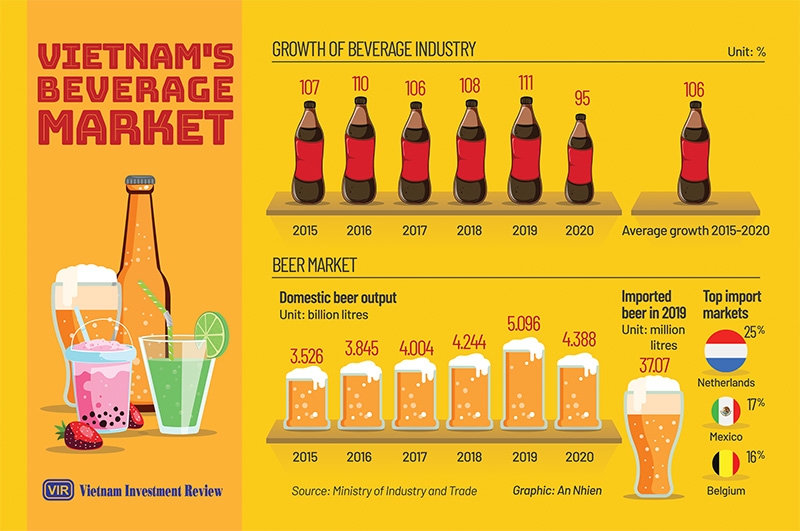Competition heating up in alcoholic beverages sector
 |
| Nguyen Van Viet, chairman of the Vietnam Beer-Alcohol-Beverage Association |
What is your assessment of the beer, wine, and spirits market in the past year, along with the efforts of companies to take on new challenges?
The beer, wine, and spirits sector has undergone three decades of development. Many years ago it was one of the sectors bogged down in difficulties due to the chronic shortage of input materials, while foreign goods – particularly Chinese items – overwhelmed the domestic market. With the clear-sighted leadership of the government, the sector has gradually consolidated its footing and managed stable on-year growth.
From last January, the Law on Prevention and Control of Harms of Liquor and Beer Abuse came into force, and shortly after that was the enactment of a decree featuring heavier sanctions on drivers with alcohol on their breath. After the pandemic approached in March, the sector had almost been paralysed in the wake of these factors. Earlier last year, the tax authorities even delivered a forecast of a possible loss of more than VND30 trillion ($1.3 billion) in tax payments.
The sector’s contribution is significant given the fact that each year the alcoholic beverage sector contributes more than VND50 trillion ($2.2 billion) to the state coffers with its revenue doubling that level.
From the second quarter last year, the government began to deploy wide-ranging measures to support businesses. Although players in the sector were not direct beneficiaries of this support, improved performance by other sectors is a favour factor to their growth.
New circumstances have prompted businesses to adopt innovative measures in order to get ahead. Businesses launched products directly serving consumer needs, for instance the rollout of non-alcoholic drinks and fruit-based beverages that are selling well. These include Saigon Chill and Lac Viet from SABECO, HEINEKEN’s non-alcoholic offering, and Habeco’s canned draught beer.
Businesses have also diversified the sales format with an aggressive shift to online transactions. Consequently, the sector’s business rebooted sharply in the second and third quarters of 2020, even reaching revenues seen in the similar periods in 2019.
Over the whole year due to pandemic implications, the sector incurred about 15-16 per cent drop in revenue on-year. But with improvements in products and profits, other business targets had resumed to fairly satisfactory levels amid COVID-19 impacts.
This year continues to be a challenging one due to a combination of factors, especially the complex and unpredicted situation with the pandemic both domestically and globally. But with effective containment of COVID-19, I expect the sector’s performance this year here could be equal to, and even surpass, last year.
 |
The sector is deemed a fertile land which is charming a slew of leading players, as the country integrates further into the global economy. What difficulties does this pose to its development?
The domestic market has certain advantages. For years, the government has been stimulating development with fairly open policies that provide the best conditions for foreign players. Key global players like AB InBev, HEINEKEN, Carlsberg, and Sapporo have all made forays into Vietnam. This has heated up competition in the domestic market that forces local players to improve themselves, including their management expertise to compete head-on with foreign players.
However, current management mechanisms are cause for some concern. For instance, in regards to equitisation plans at state-owned enterprises, there are roadmaps on stake sales to strategic investors or capital divestment. These plans sometime bother management and employees in crafting well-conceived development plans for the long haul. Otherwise, state-owned enterprises trusted with their proven capacity and well-conceived investment in improving consciousness, management skills, and finance can compete head-on with weighty foreign players.
Sustainability is one of the key pillars of business development. How have businesses in the sector embraced the trend?
Since the first years of open-door policy in Vietnam, many local businesses in the sector have made great efforts in investment to reach the level seen in the wider region and worldwide in terms of equipment, technology, management expertise, environmental protection, and sustainable development.
For instance, the personnel at the sector’s top players like SABECO possess very good management skills. They have a good grip on advanced management such as environmental management, or latest management methods.
Foreign players based in Vietnam also do a smart job in this field, leveraging their track record.
These top players, both from here and overseas, are not only good at production but also properly care for sustainability factors. They have all participated in national programmes on sustainable development, worked on concrete annual plans, and held top positions on Vietnam’s sustainability list.
What the stars mean:
★ Poor ★ ★ Promising ★★★ Good ★★★★ Very good ★★★★★ Exceptional
Related Contents
Latest News
More News
- Masan Consumer names new deputy CEO to drive foods and beverages growth (February 23, 2026 | 20:52)
- Myriad risks ahead, but ones Vietnam can confront (February 20, 2026 | 15:02)
- Vietnam making the leap into AI and semiconductors (February 20, 2026 | 09:37)
- Funding must be activated for semiconductor success (February 20, 2026 | 09:20)
- Resilience as new benchmark for smarter infrastructure (February 19, 2026 | 20:35)
- A golden time to shine within ASEAN (February 19, 2026 | 20:22)
- Vietnam’s pivotal year for advancing sustainability (February 19, 2026 | 08:44)
- Strengthening the core role of industry and trade (February 19, 2026 | 08:35)
- Future orientations for healthcare improvements (February 19, 2026 | 08:29)
- Infrastructure orientations suitable for a new chapter (February 19, 2026 | 08:15)

 Tag:
Tag:



















 Mobile Version
Mobile Version